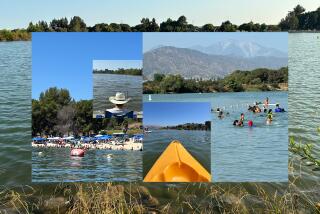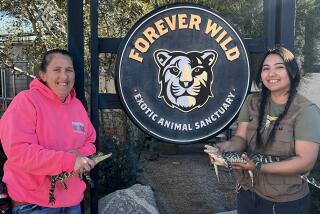Reggie Has a New Nemesis in Evacuee
Three weeks after fleeing Hurricane Katrina, one New Orleans evacuee took up a new home Saturday — next to an alligator-infested park lake in Harbor City.
Storm victim Thomas “T-Bone” Quinn pledged to camp next to Lake Machado until he could track down an urban gator that for more than a month has given the slip to professional alligator hunters.
“Where I come from there ain’t a gator you can’t catch,” explained Quinn, a pipe fitter on an offshore oil drilling platform who was evacuated to Los Angeles from the Gulf Coast on Sept. 11. Since then, he has been staying with other evacuees at a church-sponsored shelter in Echo Park.
“Gator wrangling is a way of living in Louisiana. Back home, everybody does it,” said Quinn, 47.
“This lake ain’t nothing. It’s a mudhole,” he said Saturday at a news conference called to announce his search. “I will stay right here until I catch him. I haven’t walked it, but he has a lot of space here. All you have to do is figure out his habits.”
The alligator, a former pet named Reggie allegedly dumped illegally in Lake Machado by its owner, is estimated to be up to 10 feet long. It was first seen in the park waters Aug. 12. Since then, it has attracted worldwide attention by eluding experts and, for a time, sharing the lake area with a smaller alligator that was also apparently illegally released by a pet owner.
Los Angeles City Councilwoman Janice Hahn, who represents the harbor area, had invited Quinn to try his hand. Hahn said she learned of Quinn last week from a Times reporter investigating a hoax report that a Colorado alligator hunter had snared Reggie.
“I called T-Bone up and was completely won over,” she said after the news conference Saturday. “He’s got experience. I said, ‘Come on over.’ Besides, with these evacuees, we have to give them something to do while they’re here.”
Quinn said he was an outdoors lover and an experienced bayou camper with vast experience catching Louisiana alligators.
“I’ve done it a long time. I’ve got my fair share of them, I promise,” he said. “I’ve even been bit by one. I’ve got the bites on my leg.”
He declined to show the scars.
“I gotta pull my boot off and all that. It ain’t no big thing, just a couple of teeth marks. I’m not mangled up or anything. He got me when I was twisting. We was killing him and he didn’t want to be got. We got him in the boat. You grab them by both feet and flip them over and stab them in the back of the neck, through the brain right there. But we’re going to be easy with Reggie.”
Quinn said that when hunting alligators in Louisiana, “you keep the tail for yourself and sell the hide.”
But Reggie will be taken alive and offered to the Los Angeles Zoo, he said.
Although the city paid a Colorado alligator hunter $800 a day for two days of fruitless searching and is paying the living expenses of a team of experts from Gatorland in Florida for an ongoing hunt, Quinn isn’t being paid. But he acknowledged he wouldn’t turn down money that might help him pay for a permanent place to stay here.
“He said he just wanted to thank Los Angeles,” Hahn said. “He said, ‘I want to pay them back for sheltering me and welcoming me.’ ”
As Hahn and Quinn talked, Gatorland expert Tim Williams and three others were slowly cruising across the 53-acre lake in a motorized pontoon boat, looking for Reggie.
Quinn shook his head. “The first thing I’d do is take that boat out of there. It’s making too much noise. He’s running the gator farther and farther back. He’s got his little den. He don’t venture out too far from that.”
Quinn said that he’ll use a flashlight to illuminate the alligator’s eyes at night and follow it back to its den. There, “I can grab him by his tail and pull him out, or I can block his den off and dig him up.
“I just hope I can keep Gatorland off my back. I ain’t telling them nothing. That pontoon boat is retarded.”
Quinn studied the far side of the lake for a suitable camping spot. Then he headed off with a friend to look for a close-by Mexican restaurant. “First thing I’m going to do is probably get something to eat,” he said.
As the night wore on, a nearly full moon rose over the crescent-shaped lake. Lights from a nearby refinery reflected off the still waters.
But there was no sign of Quinn and his flashlight — and no sign of Reggie the gator.More to Read
Sign up for Essential California
The most important California stories and recommendations in your inbox every morning.
You may occasionally receive promotional content from the Los Angeles Times.










